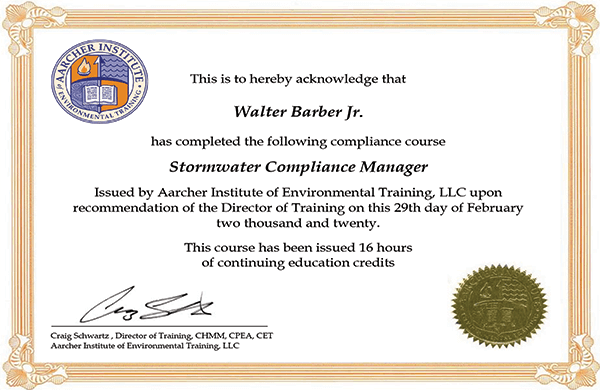Our 2-Day stormwater compliance and stormwater pollution prevention plan (SWPPP) training course prepares you to develop plans and permit applications and manage facility stormwater compliance.
Confidently manage stormwater discharge compliance.
Stormwater discharges from certain industrial activities are subject to environmental permitting requirements. The success of your facility’s regulatory compliance is contingent upon understanding permitting requirements and options; how to develop, review, or improve a SWPPP; and effective implementation techniques. This course will guide you through the critical regulatory background and practical application necessary to maintain compliance with this strictly enforced regulatory program.
Most SWPPPs are prepared and implemented at a facility level, without initial permitting authority review, so the first (or only) agency evaluation of a facility’s stormwater compliance program occurs during regulatory enforcement inspections. Proactively pursuing full compliance alleviates the risk of unanticipated outcomes from those inspections.
Prepare and implement a SWPPP, monitor compliance, prepare for inspections.
Facilities subject to stormwater discharge permitting under the National Pollutant Discharge Elimination System (NPDES), either at the Federal or state level, must obtain the appropriate permit, develop SWPPPs, and effectively implement a program. Those challenged with achieving compliance with industrial stormwater discharge requirements must understand applicable restrictions, required actions, and prohibited activities well beyond basic regulatory language.
Because facilities differ in terms of site configurations, potential pollution sources, receiving water type, and opportunities to control exposure, stormwater regulations are intentionally flexible, allowing facilities to conceive of best management practices (BMPs) suitable to protect water quality. The flexibility to select BMPs on a facility-specific basis also presents risks of errors, missed opportunities, and compliance deficiencies. Current interpretations, agency guidance, and practical on-the-ground applications pose a challenge to both new and experienced environmental professionals.
The monitoring and sampling required by NPDES stormwater discharge permits pose another compliance challenge, as facilities must consistently complete monitoring in a valid and well-documented manner while complying with directives embedded in permits.
Because industrial stormwater discharges are regulated at the state level in most states, this course focuses on permit and SWPPP requirements common to all states. Federal requirements (applicable in Massachusetts, New Hampshire, New Mexico, and the District of Columbia, tribal lands, Puerto Rico, Virgin Islands, and Guam) are addressed specifically and state-level permits and SWPPP requirements are addressed based on the applicability and interest of course attendees.
Who should attend this course?
The Industrial Stormwater Compliance Manager™ course is developed for individuals responsible for managing stormwater permitting at a facility or organizational level, developing SWPPPs, or implementing SWPPP and managing permit compliance.
- Plan Preparers — SWPPPs must be prepared following good engineering practices and to industry standards. SWPPPs should be prepared by “qualified personnel.” This can be an internal employee who is knowledgeable in the principles and practices of industrial stormwater controls and pollution prevention and possesses the education and ability to assess conditions at the industrial facility that could impact stormwater quality, and the education and ability to assess the effectiveness of stormwater controls selected and installed to meet the requirements of the permit.
- PEs/PGs — EPA may require that a licensed professional engineer (PE) or licensed professional geologist (PG) certify the plan in certain circumstances. PEs or PGs certifying SWPPPs must be knowledgeable in the principles and practices of industrial stormwater controls and pollution prevention. They must also possess the education and ability to assess conditions at the industrial facility that could impact stormwater quality. This course provides a means to demonstrate that required knowledge and capability.
- Environmental Compliance Managers who are responsible for stormwater discharge compliance or overall facility compliance. Whether you are responsible for an existing SWPPP, NPDES permit compliance, or deploying BMPs, this course will provide the knowledge base to confidently manage SWPPP implementation at industrial facilities.
- EHS Professionals who need to more fully understand stormwater permitting and compliance. This course provides a review of the regulatory requirements, operational challenges and considerations, and practical application of knowledge for inspections, sampling, and selection of BMPs.
State Requirements – California provides specific requirements for preparers of SWPPPs. This course provides the training necessary for plan preparers in most states but does not provide state-level certification for California where such certification is required.
Employee Training – You must train all employees who work in areas where industrial materials or activities are exposed to stormwater, or who are responsible for implementing activities necessary to meet the conditions of your NPDES permit. This course will provide you with the tools needed to prepare facility-specific training that satisfies the training requirements of the permit.
What is the course format?
Industrial Stormwater Compliance Manager™ is presented as a series of topical modules in a logical sequence, exercises, and open discussions to keep the instruction interesting and enjoyable. Each module is designed to foster open class discussion to explore the finer points of these requirements. Class exercises are used to break up the day and apply new information to real-life scenarios, including evaluations of facility SWPPPs.
Students are encouraged to bring copies of SWPPPs and stormwater NPDES discharge permits, if available, so they can be reviewed by classmates and the instructor during class. The result is a valuable action plan for improving your plan, simplifying plan implementation, and ensuring permit compliance. Sample SWPPPs are made available for students that are not able to bring facility-specific plans.
What does this course deliver?
You will leave the course prepared to take on the preparation of a SWPPP and management of a stormwater discharge compliance program. You will understand the practical application of these regulations at a facility level and be prepared for agency compliance inspections. Course binder and handout materials are useful references for your continued use, and you will have the instructor’s contact information for any future questions.
